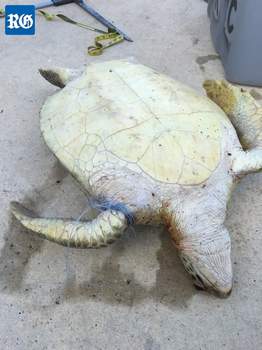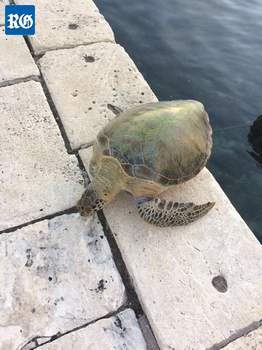Recent News
Endangered turtle returns to oceanTuesday, July 19, 2016
Exactly 200 days after two fishermen found her bobbing aimlessly off the North Shore and gasping for every breath, Daisy the loggerhead turtle has been returned to the open ocean.
Shedding light on mysteries of deep
Tuesday, July 19, 2016
A deep ocean research mission is set to begin off the coast of Bermuda tomorrow
Financial boost for marine research project
Saturday, July 16, 2016
A global marine research project that will begin in Bermuda has received its first financial donation from a local firm.
Ocean Tech Initiative Receives Local Support
Wednesday, July 13, 2016
Only one week after launching Ocean Tech – a global marine research project to help save the world’s oceans – the team of scientists, conservationists and media specialists who are leading this ambitious endeavour have received their first local donations.
Snake captured in Sandys
Friday, July 08, 2016
Conservationists have warned of the disastrous consequences snakes could have on Bermuda’s wildlife after a species of kingsnake was captured in Sandys.
About
GovernanceAbout Us
Newsletter
Latest News
Gift & Bookstore
Contact
General Inquiries
info@bzs.bm
Latest News
All the latest updates and news from the Bermuda Aquarium, Museum, and Zoo, one of Bermuda's leading visitor attractions!
Simon Jones
Published Nov 12, 2017 at 12:07 pm (Updated Nov 15, 2017 at 5:28 am)

Animal welfare experts have urged the public to act quickly and call the aquarium if they see signs of a turtle in distress.
The call came after a young green turtle died in the waters off Lagoon Park, in Sandys, after it got entangled in monofilament line attached to a boat mooring.
The animal had been seen circling the mooring by local residents two days earlier, but no one had realised it was trapped.
A concerned citizen contacted Patrick Talbot, the curator of the aquarium and zoo, on Sunday afternoon, but by that time the animal had died.
Mr Talbot said: “I confirmed that the turtle was spotted two days earlier hanging around the mooring by a member of the public.
“They were concerned on Saturday that there might be a problem as it was still there, but when the turtle was approached, it dove underwater and out of sight. Unfortunately, it drowned late on Sunday morning.
“We want to stress the importance of early reporting but also the importance of removing fishing line and other entanglement hazards from the water.
“Unfortunately, in this case, we were not able to get to the animal in time. The sooner we know, the better chance we have of saving the turtle.”

Earlier this summer, a loggerhead turtle rescued by divers was returned to the sea after nine months of care.
The turtle, nicknamed “Chad” by his rescuers, was found tangled in cargo netting in Ely’s Harbour last October by Blue Water Divers.
Ian Walker, principal curator of the Bermuda Aquarium, Museum and Zoo, said: “We are always grateful when the general public contacts us to try to save wildlife. If you suspect an animal might be tethered in place via entanglement with fishing line or other materials, please call us as soon as possible so we can investigate.
“The best number to call is the Maritime Operations Centre on 297-1010 or VHF Channel 16.
“An entangled animal that is tethered will be seen in the same place over a period of hours. “They may have trouble diving or getting their head above water and they may look like they are circling something such as a mooring buoy. In these cases, time is of the essence if we are to save the animal from injury or death.”
Dr Walker added: “Unfortunately, this is the second recent case of tethering entanglement that we have seen and we felt it was important to alert the public so they can be aware of animals in this type of distress and act accordingly.
“As always, we encourage the general public to pick up fish line and hooks if they find them discarded along our shorelines as they can become lethal traps for our wildlife.”


